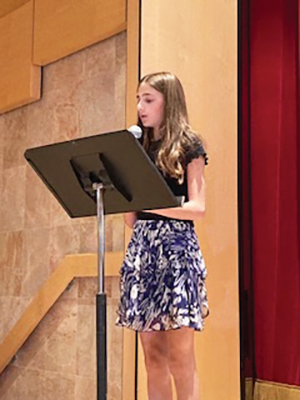
(Credit: Ellie Wolf)
This past fall, Ben Porat Yosef’s class of 2024 saw the culmination of an amazing project they had initiated as seventh graders. They had interviewed and recorded the testimonies of relatives and friends who had emigrated from several countries in the Middle East outside of Israel, referred to as “the Mizrach,” or simply “the East.” In October 2023, they presented a beautiful and moving video of those interviews to a packed audience.
Last week, this year’s seventh grade more than met the high bar set by the previous class, presenting the 2024 edition of Memories of the Mizrach. The screening took place to yet another packed house, a significantly “bigger house” this time, at the Kaplen JCC on the Palisades in Tenafly.
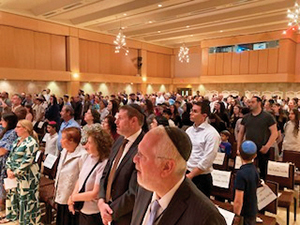
(Credit: Ellie Wolf)
The evening’s program was introduced by Head of School Rabbi Saul Zucker, replete with his brimming positivity and praise for the efforts and accomplishments of the class. Rabbi Zucker also informed the audience of a special addition to this year’s project. Tying the video together at its conclusion would be an interview with Shayla Uzan of Tunisia, with her testimonial about present day Orthodox Jewish life in this North African country, also considered to be part of the Mizrach.
This year’s video featured six testimonials, each from a grandparent of a BPY seventh grade student, and each from one of six different countries in the Mizrach.
Student speaker Grace Malka, granddaughter of Dr. Michael Malka, one of the interviewees, represented the class when she addressed the attendees. Speaking of her grandfather’s journey from Sudan, she compared the journeys of each of the Mizrach interviewees to grandparents and great grandparents coming to the United States from Eastern Europe. “It is our job to listen, record and transmit those experiences,” she emphasized. She also noted learning some things she hadn’t previously known about her ancestral family: “They brought lion and zebra skins with them,” she shared.
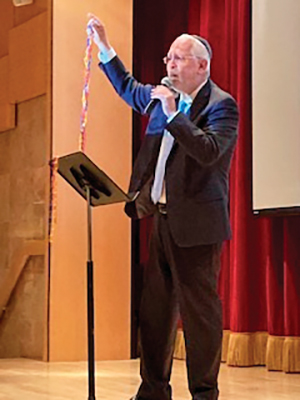
Echoing Malka’s sentiment, Rabbi Zucker noted how “…inspired and courageous these grandparents are to have gotten away.” Their courage has brought them to these shores to continue the mesorah of the Mizrach by their example and inspiration.
Acknowledgement was given to Rachel Barbara Schwartz as the brainchild of the program; kudos to Ari Greene, director of development, for his assistance with so much of what took place ‘behind the scenes;’ to Robyn Badash as the engine behind the program in her role as co-director of communications and public relations and administrative assistant; and with appreciation to BPY President Howard Kestenbaum for his leadership.
Rabbi Zucker also announced the exciting news that this year’s Memories of the Mizrach video is being considered for inclusion by the Detroit JCC’s film festival.
Below is a brief summary of the interviews.
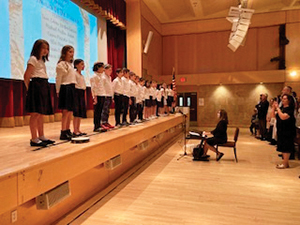
(Credit: Ellie Wolf)
Tsion Cohen was born in 1949 in a displaced persons camp in France. One of 16 children, he was actually born after the family left Tunisia, prior to settling in Tzfat, Israel.
Cohen fought in the Yom Kippur War, and soon after married Anita, from Connecticut. In the late 1970s, Tsion, Anita and their son Daniel moved to Connecticut “for one year,” stretching to over 40 years until today. Although Cohen never lived in Djerba, his older siblings did, so he grew up with many Tunisian and Mizrachi traditions. In 2022, he visited Djerba for the first time along with his two sons and granddaughter, for the annual pilgrimage that Tunisian Jews make to the ancient El Ghriba synagogue, the oldest synagogue in Africa. They were able to locate the house where his parents lived.
Malka was born in Khartoum, Sudan in 1957. In 1948, when Israel declared its independence, things became more difficult for the Jews of the Sudan. “In 1959, my parents decided it was time to leave. My parents had been assisting the Haganah and Lehi leaders, to take refuge from the British Army who were pursuing them. They provided safe harbor for Yitzchak Shamir and Yaakov Meridor, amongst many others. My greatest joy is to see my children and grandchildren continue in the footsteps of our family, deeply immersed in Jewish life.”
Nissan Natani was born in 1954 in Iran. “The Shah was good to the Jews, and Iran and Israel had a good relationship. My father’s father, Yekutiel Natani, was a certified shochet and an eye doctor. He went by horse to different villages and towns and even treated the Shah’s sister. My mother’s father was also a doctor. People from the town would come to our home for help. Sometimes people stayed several days in his house for treatment.
“My mother’s parents stayed in Iran to try to sell their house, were unsuccessful because of being Jewish, so left empty handed and joined us in Israel.”
Maurice Simony was born in Casablanca, Morocco in 1941, one of the youngest of 14 children, and lived in the mellah, the Jewish ghetto. “My father did business with Arabs and foreign embassies, and built the shul and mikvah in the mellah. The shul was attached to our home, and every Shabbat my mother prepared a kiddush in our home after prayers. At age 9 my father passed away and my mother was left to raise us on her own. At age 14, I was sent to yeshiva in London and developed a tremendous love of Torah and learning. Eventually I made my way to New York where I studied at MTJ under Reb Moshe Feinstein. I ultimately met my wife, Tova, in New York and we raised a family in Brooklyn.”
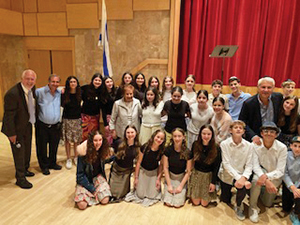
Carmi Yisrael Mizrahi’s family history dates back many generations in Baghdad, and can be traced all the way to the destruction of the Temple. “Persecution of the Jews started to rise and one day my grandfather was not feeling well and asked for help. The Arab medical authorities prescribed a pill which instead of helping him, ended his life,” and marked the beginning of persecution of their family in Iraq.
“Jews were dismissed from their posts in government ministries. The courts were corrupt and discriminated against the Jews.” So his father decided to make aliyah with his wife and a young child. Yisrael was born in Tel Aviv, the youngest of nine children, sharing a single room.
He later came to America where he met his wife, Joyce, and started their family. “I have three children named after my parents, and 11 grandchildren attending BPY.”
Alice Moss was born in Cairo to Syrian parents. After the war Nasser took over the Egyptian government and with him came antisemitism. Moss was deported, bearing just a suitcase and $20, traveling via ship from Alexandria, to Marseilles to Haifa, to the desert, and finally to Tel Aviv in 1957. She went to Paris while awaiting an entry visa to the USA, and spent a year and a half in France living in a one room hotel with her parents until arriving in the U.S. in 1960. She worked in a store while living in Brooklyn and attended Flatbush High School.
View the full video here: https://youtu.be/-XySwf5kmjE?si=9c8_bXk2-URzySdj
Ellie Wolf is a long time staff writer for The Jewish Link, also serving as Biofeedback Specialist in two local psychology practices, and conducts specialized training for mikvah attendants in working with women who are afraid of the water..












